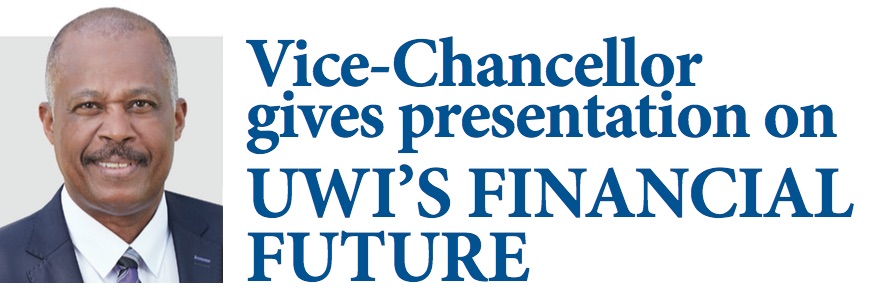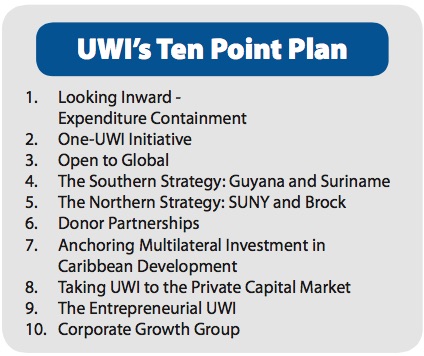
In a virtual media conference on Monday March 1, Vice-Chancellor Professor Sir Hilary Beckles outlined the challenges that the university has faced following the COVID-19 pandemic, and broke down its response to this uncertain climate.
“We have been tested in the last year in a way that we have never been tested before,” said Sir Hilary, in a presentation entitled “Facing The UWI’s Financial Future”. He noted that the university dismissed the option of closure in favour of transitioning into an “online teaching culture” and ensuring that students were able to complete their classes and graduate despite the pandemic.
In breaking down the changes that The UWI has made to ensure its financial security, the Vice-Chancellor highlighted ten steps that would allow the university to recover from the crisis. The plan, he said, leverages the institution’s reputation as its primary asset, emphasising its “reputation revolution” over the past four years.
“Our philosophy in the financial management of the university is that we are in close, intimate conversation with our governments. We understand the challenge that our governments are facing,” the Vice-Chancellor noted, but also pointed to signs of progress in governmental debt, which has been reduced from US$115,486,500 in 2015 to US$51,788,536 in 2020.

Within expenditure reduction, he also highlighted the “digital transformation” that has allowed the university to reduce inter-campus duplication and enable students from any campus to have access to digital learning from across the region.
The Vice-Chancellor then delved into the idea of the “global campus” and the initiatives that are currently underway to take The UWI’s content to the world and encourage international engagement. These include collaboration with the State University of New York (SUNY) on The UWI Centre for Leadership and Sustainable Development, and the ongoing conversation with Guyana and other regional bodies to share data and learning coming out of UWI.
Another aspect of the university’s efforts to tackle the financial challenges ahead is its engagement with international donor organisations such as the Caribbean Development Bank, CARICOM, UN agencies and the World Bank.
“We are building up relationships and developing a base to attract resources to do [policy-driven] research for this region,” said the Vice-Chancellor.
The UWI has been partnering with some of these multilateral agencies to anchor investment into Caribbean development through the university, he explained, adding that “the future of the Caribbean is tied up with the capacity of The UWI to deliver on issues facing the region”.
Within the new financial model being recommended to increase the university’s viability, the Vice-Chancellor said that “each campus was told to bring forward a bankable project, because we are going to market.”
In taking the university to the private capital market, several projects are being discussed in collaboration with governmental bodies, Sir Hilary revealed. The first is a partnership with the Government of Trinidad and Tobago to establish the Global School of Medicine. The goal is to raise a $60 million bond. This is part of the new “entrepreneurial UWI”, working with development entrepreneurs to be less dependent on the state but also deeply embedded in the state.
According to the Vice-Chancellor, the final piece of the puzzle is the Corporate Growth Group, “where [business leaders] Earl Jarrett of the Jamaica National Group, Gerry Brooks of ANSA McAL, Jeff Cobham of National Commercial Bank Jamaica, and Dodridge Miller of Sagicor have constituted the first core of the corporate growth committee, the committed private sector. These men have said, we will sit with you and figure out a financial road map for the university.”
Under this new financial model, if governments can consolidate a minimum of 50 percent (which has decreased over time from its initial output of 90 percent), with 20 percent coming from the private sector (including the university’s own private sector element), 15 percent coming from international engagements and the final 15 percent from tuition fees, the university will have a solid financial strategy to weather the ongoing crisis and beyond.
The Vice-Chancellor ended his presentation with a call that, “Everyone be safe. This is a rough time for our region, but I am proud of The UWI.”
The entire presentation, “Facing The UWI’s Financial Future”, can be viewed at the UWI St Augustine and UWI TV Facebook pages.